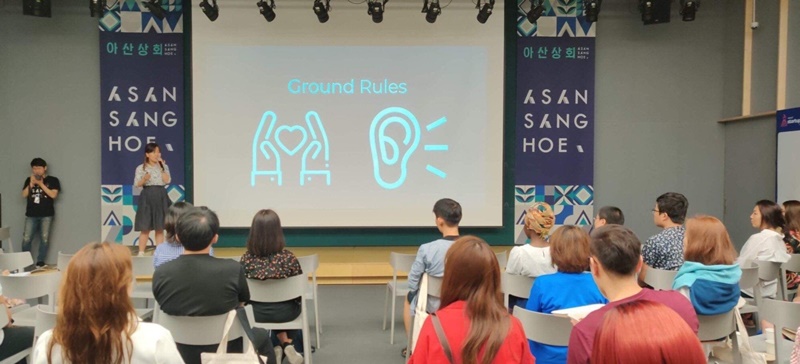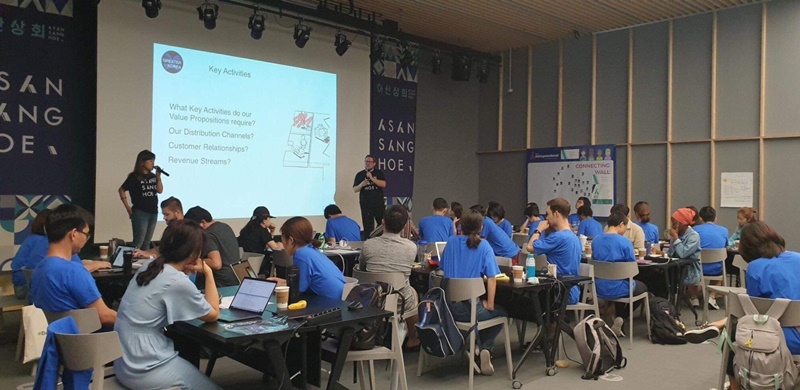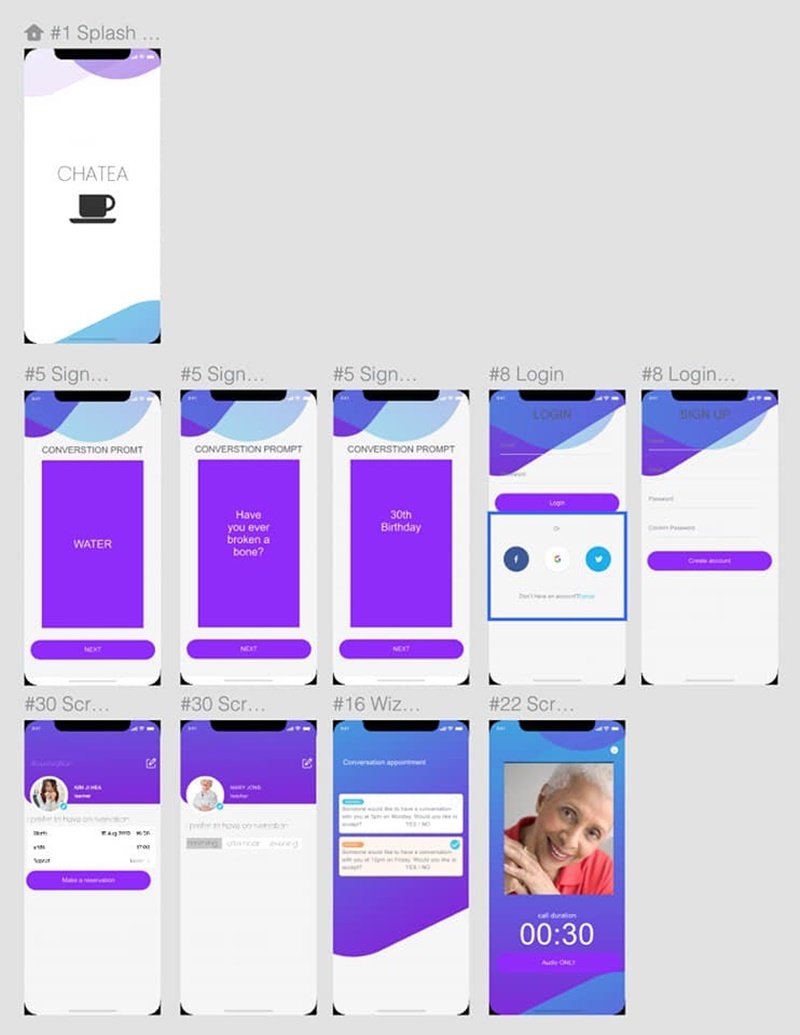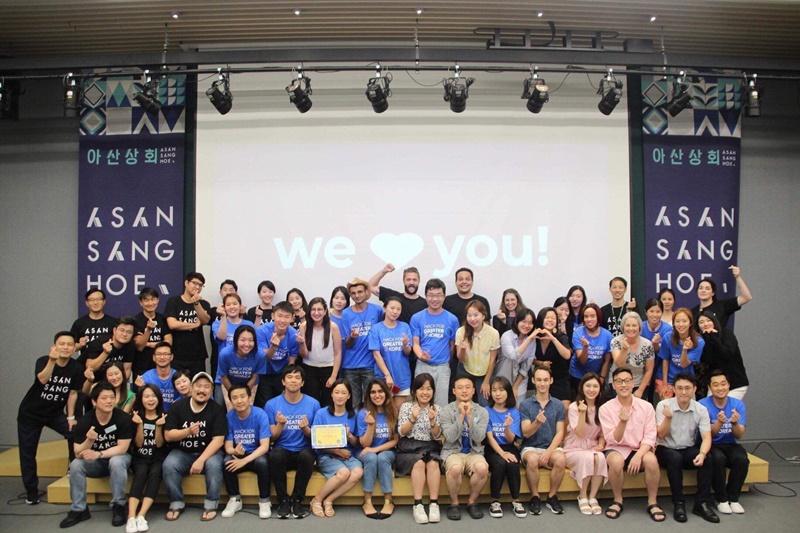View this article in another language
- 한국어
- English
- 日本語
- 中文
- العربية
- Español
- Français
- Deutsch
- Pусский
- Tiếng Việt
- Indonesian
By Honorary Reporter Alice Hong from Canada

The idea that anyone can become an entrepreneur regardless of background might sound too good to be true. This was the key concept, however, behind the groundbreaking event "Hack for Greater Korea" in Seoul from Aug. 14-16. As one of the participants, I got a glimpse of the startup world with the help of veteran entrepreneurs and experts.
Around 30 young individuals from both Koreas as well as abroad were chosen for this event. We spent nearly 54 hours at the Asan Namun Foundation generating ideas, networking and drinking copious amounts of coffee to create business models that eventually underwent evaluation by a panel of judges.
Six organizations made this hackathon possible including the foundation, whose name is derived from the nickname of the late founder of Hyundai Group, Chung Ju-yung. Since Chung was born in North Korea, organizations that provide care for North Korean defectors and seek to improve inter-Korea relations were involved, in addition to startup initiatives such as Weave and HBM (MTA Korea).

Many of the foreign participants were university students, while the others in Korea taught English or started or ran businesses. The event's host Jay Kim helped us understand what was going on through live interpretation, and this, along with food and other resources, enabled the Korean and foreign attendees to mesh despite their differences.
This event clearly took a lot of inspiration from Startup Weekend, an idea that has gone viral worldwide since its inception in 2007. We spent the first day getting to know each other by making pitches and forming teams. The second day saw each team receive coaching from a mentor and taking time to brainstorm. By the last day, everyone had to present their startups on stage.

The theme of Korean reunification as well as positive global impact was a major part of the discourse in the hackathon; many teams wanted to tackle economic and social issues such as poverty and depression. Our team invented the app Chatea to resolve social isolation of the elderly in Britain and the lack of opportunities for Korean students who want to converse in English.
The hackathon was designed to provide people from different walks of life a chance to work together. I got to learn the basics of a startup from several of the best mentors in Seoul. Our team received coaching from Chris Georgiev, the co-founder of an image recognition AI called Imagga, as well as Eunielle Yi, CSO of Spin Protocol, and Chae Dong Un, founder of startup accelerator Krypton.

What I love about living in Korea is the numerous opportunities for foreigners who want to grow. As a follow up to this event, the foundation will sponsor the startup training program Asan Sanghoe, which aims to foster the next generation of social entrepreneurs. The program will be the first of its kind held by the foundation.
kimmj7725@korea.kr
*This article is written by a Korea.net Honorary Reporter. Our group of Honorary Reporters are from all around the world, and they share with Korea.net their love and passion for all things Korean.

An orientation on Aug. 14 is held on the first day of the hackathon to lay the ground rules for the event. (Lin Yang)
The idea that anyone can become an entrepreneur regardless of background might sound too good to be true. This was the key concept, however, behind the groundbreaking event "Hack for Greater Korea" in Seoul from Aug. 14-16. As one of the participants, I got a glimpse of the startup world with the help of veteran entrepreneurs and experts.
Around 30 young individuals from both Koreas as well as abroad were chosen for this event. We spent nearly 54 hours at the Asan Namun Foundation generating ideas, networking and drinking copious amounts of coffee to create business models that eventually underwent evaluation by a panel of judges.
Six organizations made this hackathon possible including the foundation, whose name is derived from the nickname of the late founder of Hyundai Group, Chung Ju-yung. Since Chung was born in North Korea, organizations that provide care for North Korean defectors and seek to improve inter-Korea relations were involved, in addition to startup initiatives such as Weave and HBM (MTA Korea).

Participants at the hackathon formed teams to create startups based on the most popular ideas. (Lin Yang)
Many of the foreign participants were university students, while the others in Korea taught English or started or ran businesses. The event's host Jay Kim helped us understand what was going on through live interpretation, and this, along with food and other resources, enabled the Korean and foreign attendees to mesh despite their differences.
This event clearly took a lot of inspiration from Startup Weekend, an idea that has gone viral worldwide since its inception in 2007. We spent the first day getting to know each other by making pitches and forming teams. The second day saw each team receive coaching from a mentor and taking time to brainstorm. By the last day, everyone had to present their startups on stage.

These are sample images of the app Chatea that I helped create. (Pavel Shin)
The theme of Korean reunification as well as positive global impact was a major part of the discourse in the hackathon; many teams wanted to tackle economic and social issues such as poverty and depression. Our team invented the app Chatea to resolve social isolation of the elderly in Britain and the lack of opportunities for Korean students who want to converse in English.
The hackathon was designed to provide people from different walks of life a chance to work together. I got to learn the basics of a startup from several of the best mentors in Seoul. Our team received coaching from Chris Georgiev, the co-founder of an image recognition AI called Imagga, as well as Eunielle Yi, CSO of Spin Protocol, and Chae Dong Un, founder of startup accelerator Krypton.

The mandatory group photo on Aug. 16 is taken on the final day at Asan Hall. (Lin Yang)
What I love about living in Korea is the numerous opportunities for foreigners who want to grow. As a follow up to this event, the foundation will sponsor the startup training program Asan Sanghoe, which aims to foster the next generation of social entrepreneurs. The program will be the first of its kind held by the foundation.
kimmj7725@korea.kr
*This article is written by a Korea.net Honorary Reporter. Our group of Honorary Reporters are from all around the world, and they share with Korea.net their love and passion for all things Korean.